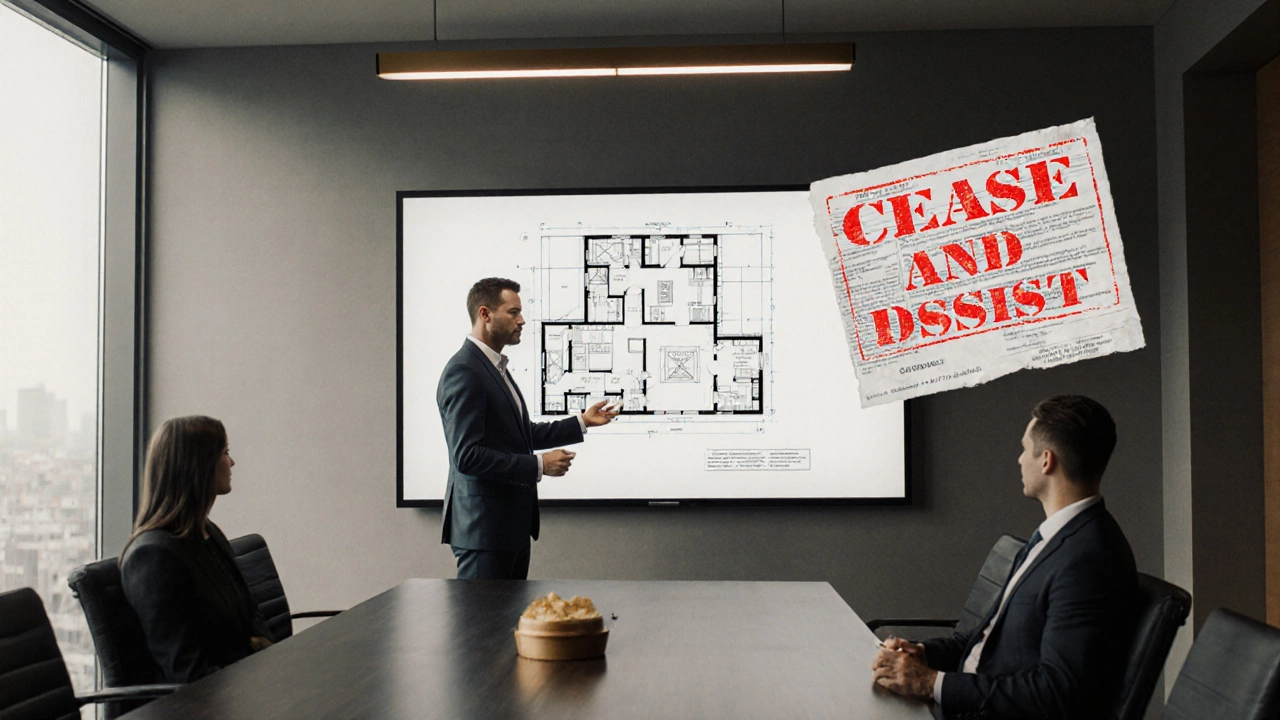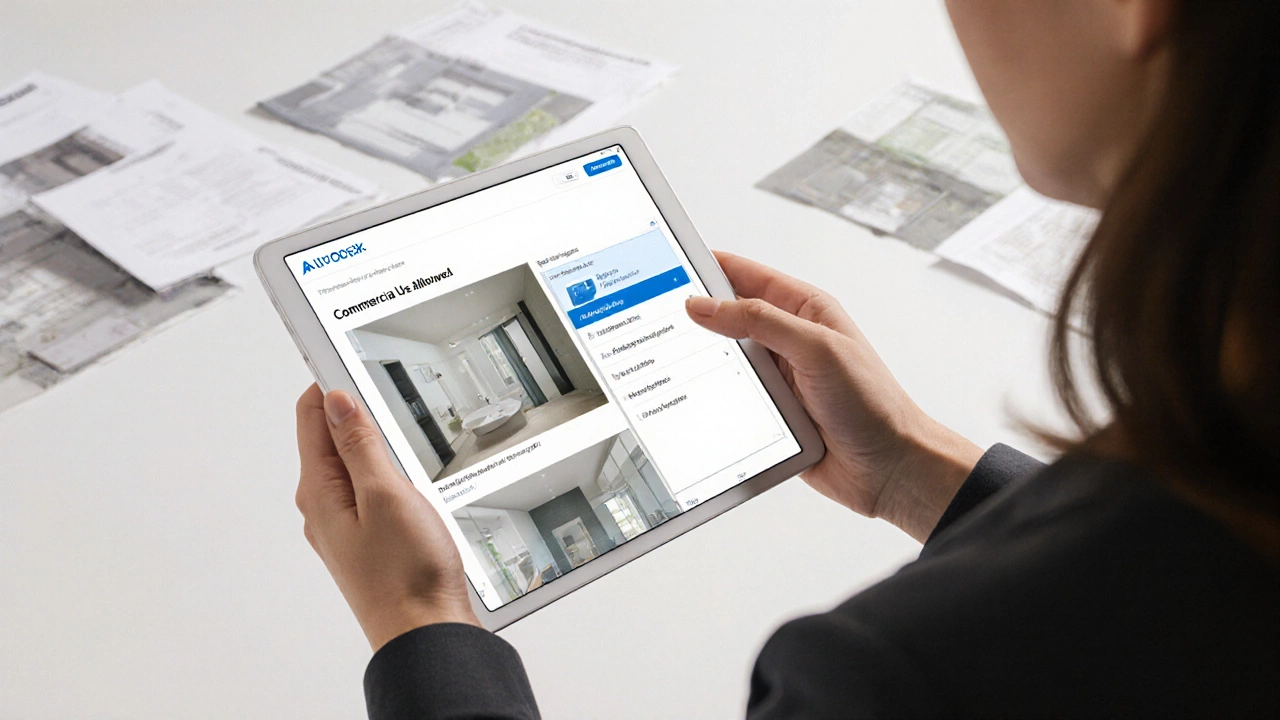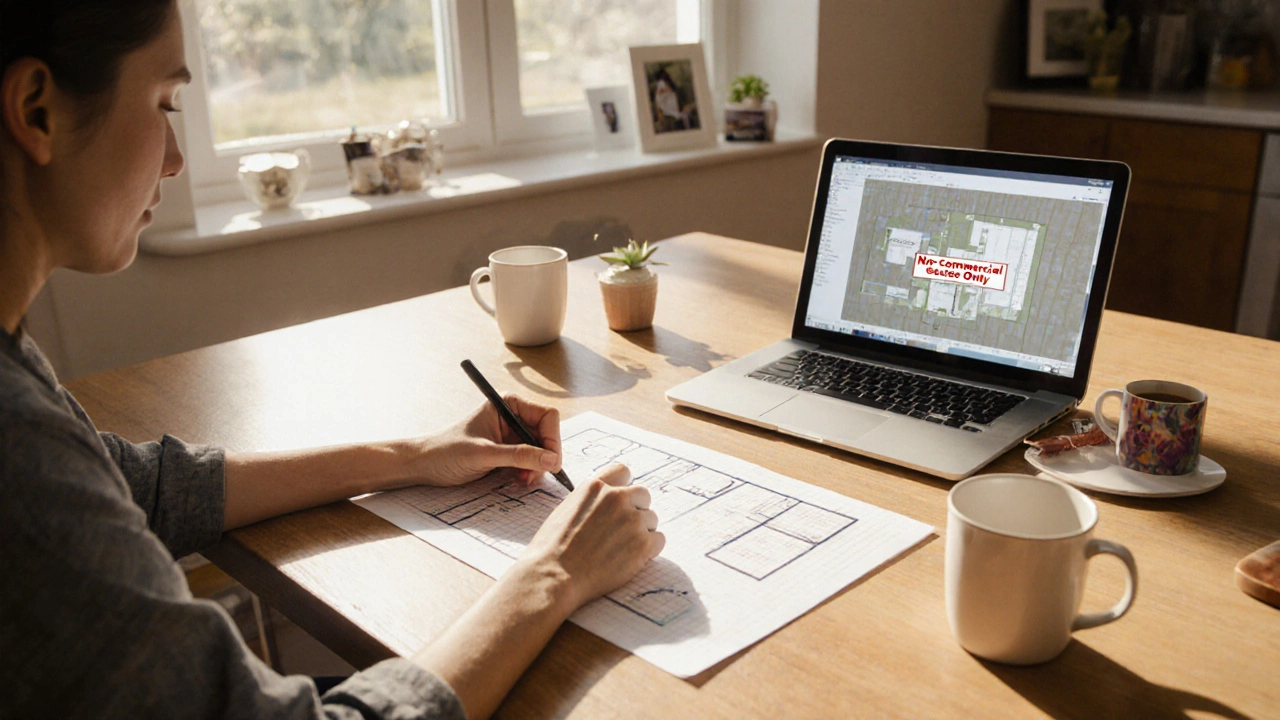Non-Commercial License Checker
Check if your construction or design project qualifies for non-commercial use. This tool helps you avoid legal risks and copyright violations.
If you’ve ever downloaded a blueprint, a 3D model, or even a logo for a building project, you might’ve seen the phrase licensed for non-commercial. It sounds simple-but in construction, where every detail can mean legal risk or big savings, misunderstanding this term can cost you time, money, or even lead to lawsuits.
Let’s cut through the jargon. 'Licensed for non-commercial' means you can use the material-but only if you’re not making money from it. That’s it. No sales. No projects billed to clients. No use in anything tied to a business. If you’re a homeowner fixing up your own house? Fine. If you’re a contractor using it on a client’s office building? That’s a violation.
Why This Matters in Construction
Construction isn’t just about steel and concrete. It’s full of copyrighted assets: architectural renderings, CAD files, lighting designs, even custom tile patterns. Many of these are shared online by designers, architects, or hobbyists under non-commercial licenses. They’re generous with their work-but they don’t want it turned into a profit machine for someone else.
Imagine you find a beautiful kitchen layout online. It’s labeled 'licensed for non-commercial use.' You love it. You tweak it a little, then you use it in a proposal for a restaurant client. You get the job. You bill them $45,000. Now, the original designer finds out. They own the copyright. Even if you changed the cabinets, the overall layout is still theirs. You didn’t just copy a photo-you used their intellectual property to make money. That’s not fair use. That’s infringement.
The Construction Industry Institute found that 27% of small firms faced legal threats over unlicensed design assets between 2022 and 2024. Most didn’t even realize they’d broken the rules. They thought, 'It’s just a template. Everyone uses these.' But the law doesn’t care what everyone does. It cares what the license says.
What You Can and Can’t Do
Here’s the breakdown, plain and simple:
- Can use: Personal home renovations, DIY projects, school projects, mockups for your own portfolio (if not used to attract paying clients)
- Cannot use: Client projects, bidding proposals, marketing materials, printed brochures, website portfolios used to attract business, branded signage, commercial installations
Let’s say you’re a freelance designer. You create a website to show off your work. You include a bathroom design you downloaded from a free resource labeled 'non-commercial.' You tag it 'Project: Modern Bathroom.' That’s fine-if you’re not charging anyone to see it. But if you put that same design on your portfolio page and someone hires you because of it? You’ve turned a non-commercial asset into a commercial tool. That’s a breach.
Same goes for contractors. You’re bidding on a hotel renovation. You use a free floor plan you found online. You didn’t pay for it. You didn’t get permission. You just used it to win the contract. Even if you later hired an architect to redo it, the fact that you used the unlicensed version to secure the job is enough for legal action.
How to Spot a Non-Commercial License
Not all free downloads are equal. Here’s how to read the fine print:
- Look for phrases like: 'For personal use only,' 'Not for resale,' 'Non-commercial use permitted,' 'Do not use in client projects'
- Avoid vague terms: 'Free to use' doesn’t mean 'free to profit from.' Always check the license document, not just the download button.
- Check the source: Sites like SketchUp 3D Warehouse, FreeCAD Models, or ArchDaily often label licenses clearly. If it’s on Pinterest or a random blog? Assume it’s risky.
Some licenses even specify 'non-commercial' in the file name-like 'kitchen_layout_noncommercial_v2.dwg.' That’s your warning sign.

What Happens If You Break the Rules?
Most designers won’t sue right away. But they can-and will-send a cease-and-desist letter. That’s usually the first step. If you ignore it, they can:
- Demand you remove all materials using their work
- Require you to pay damages (often $5,000-$25,000 per violation)
- File a copyright claim that blocks your project from permits or inspections
- Report you to industry associations, damaging your reputation
In 2023, a Manchester-based firm was forced to halt a £1.2M commercial retrofit after a designer discovered their floor plan had been copied from a non-commercial SketchUp model. They had to pay $18,000 in legal fees and redesign the entire layout from scratch. They lost three weeks of schedule and two clients.
Safe Alternatives
You don’t need to risk it. There are plenty of legal options:
- Buy a commercial license: Many sites offer the same models for $20-$150 with commercial rights included. It’s cheaper than legal fees.
- Use royalty-free libraries: Sites like Autodesk Seek, BIMobject, or GrabCAD have filters for 'commercial use allowed.'
- Commission your own: Hire a local designer for a flat fee. You own the rights. No surprises.
- Use open-source or CC0: Materials labeled 'Creative Commons Zero' (CC0) are public domain. No license needed.
One firm in Leeds switched to using only CC0 and commercial-licensed assets in 2024. They reported a 40% drop in project delays due to legal issues and saved an average of £8,200 per year in avoided fines and redesigns.

When in Doubt, Ask
If you’re unsure about a file’s license, don’t guess. Contact the creator. Most are happy to clarify. A simple email like:
'Hi, I found your kitchen design on [site]. I’d like to use it in a commercial project for a client. Is it possible to purchase a commercial license, or is there an alternative you recommend?'
That’s how professionals handle it. That’s how you protect your business.
Final Rule: If You’re Getting Paid, You Need a Commercial License
That’s the golden rule. No exceptions. Not even if you're a small team. Not even if you're 'just using it for reference.' If money changes hands-your license must cover it.
Non-commercial doesn’t mean 'free.' It means 'not for business.' Treat it like that. Your clients, your reputation, and your bottom line will thank you.
Can I use a non-commercial design if I don’t charge my client directly?
No. If the project is part of your business-even if you’re doing it for a friend or family member as a favor-it’s still commercial use. The license is based on the context of the work, not whether you invoice the person. If you’re operating as a contractor, designer, or builder, any project you take on counts as commercial.
What’s the difference between 'royalty-free' and 'non-commercial'?
Royalty-free means you pay once and can use it multiple times, including commercially. Non-commercial means you can use it for free-but only if you’re not making money from it. A royalty-free license usually includes commercial rights. A non-commercial license explicitly excludes them. Don’t assume they’re the same.
Can I modify a non-commercial design to make it my own?
Modifying it doesn’t change the license. Even if you change the colors, layout, or materials, the core structure or concept is still protected by copyright. You’re still using someone else’s intellectual property for commercial gain. The only safe way is to get permission or buy a commercial license.
Are government or nonprofit projects exempt from non-commercial licenses?
No. Non-commercial licenses refer to the user’s intent, not the client’s. If you’re a contractor working on a school or hospital, you’re still using the asset in a business context. The license doesn’t care if the end-user is a nonprofit. Only the person using the asset matters.
What if I didn’t know the license was non-commercial?
Ignorance isn’t a legal defense. Copyright law doesn’t require intent to violate. If you used a file that was clearly labeled 'non-commercial,' you’re responsible for reading the terms. Always check the license before downloading. If it’s not clear, don’t use it.
